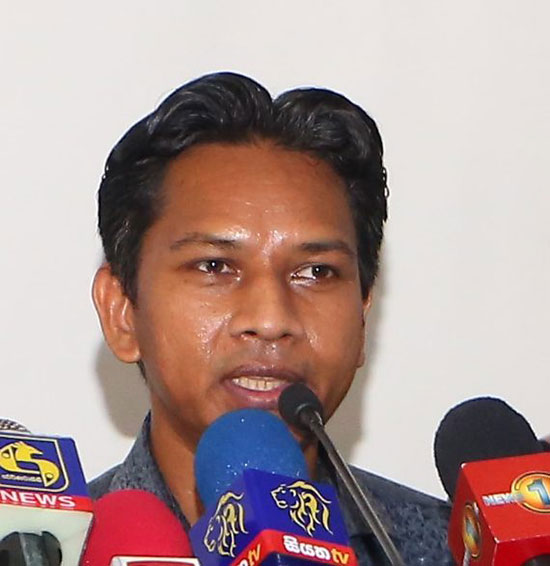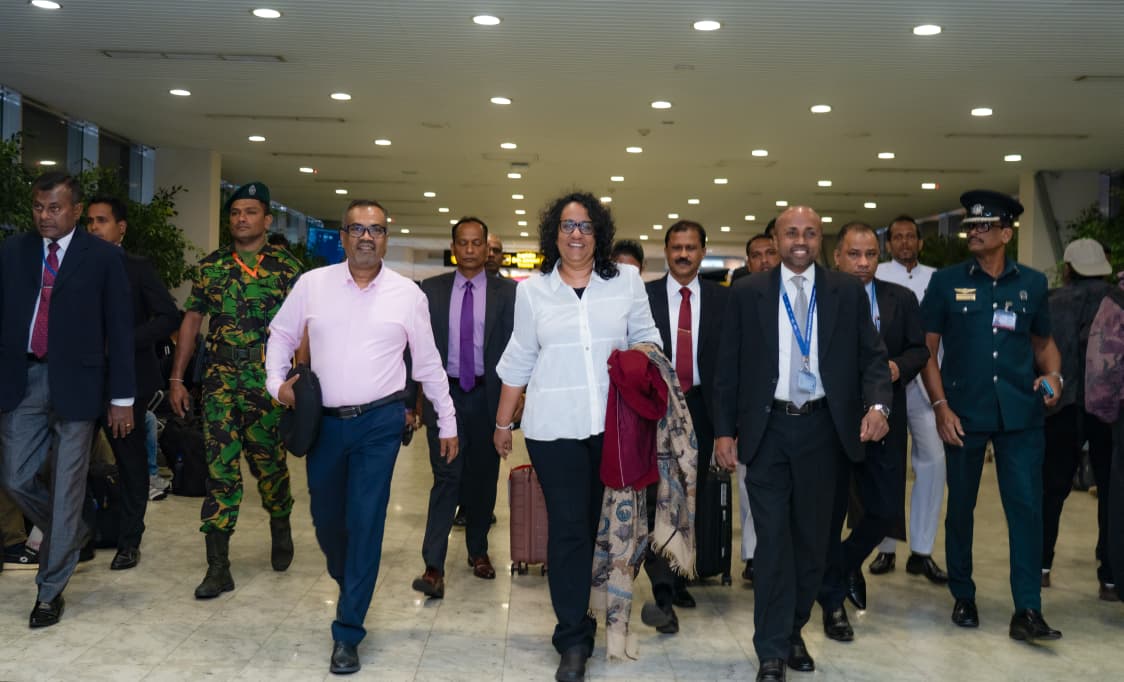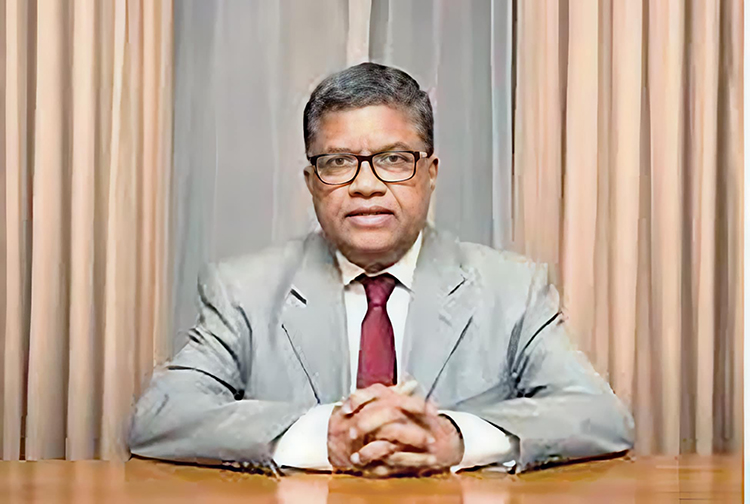News
Aloe vera export project set to grab 6% of land in Anuradhapura

… will spell doom for farmers, forests……
By Rathindra Kuruwita
The Cabinet on 30 August 30 approved a proposal for handing over 6% of the total land area in the Anuradhapura District to a private company to grow aloe vera, and this will have a disastrous impact on the environment, climate and human elephant conflict in the North Central and North Western Provinces, Sajeewa Chamikara of the Movement for Land and Agricultural Reform (MONLAR) says.
The Cabinet had approved a paper jointly presented by Minister of Finance Basil Rajapaksa and Minister of Lands S. M. Chandrasena for the handover of 104,066 acres (42,115 hectares) of Anuradhapura land to a private company on a long-term lease of 30 years, Chamikara said.
“Although the project was officially approved only a few weeks ago, the company had been illegally using large swathes of land, used by farmers of Rajanganaya Track 18 village as well as lands that had been under the control of the Forest Department for over three years. These lands have been illegally acquired without the approval of any state institution,” Chamikara said.
The 104,066 acres earmarked for the project include 2,000 acres in Rajanganaya and Nochchiyagama Divisional Secretariat areas, earmarked as a plant nursery, 102,000 acres from several areas of the Anuradhapura District for planting aloe vera and another 66 acres for a factory, a field office and storage units, Chamikara said.
“These lands are to be handed over on a 30-year lease as well as per the provisions of the State Lands Ordinance. The 102,000 acres, to be used as the aloe vera plantation, consists of cultivated lands belonging to families who had been living in these lands for a long time. These are farmers who have been given state land under various schemes. They hold various land titles. The total investment in this project is US $ 783 million. The Cabinet Paper states that US $ 300 million will come into the country as the initial investment,” he said.
Chamikara added that the total land area of Anuradhapura was 717,900 hectares. Out of this, 42, 115 hectares had been allocated to the aloe vera project. The project would make aloe vera the second largest cultivated crop in the district,after paddy, he said.
“However, is it correct to allocate such a vast land area for the cultivation of aloe vera for export? What is the land use pattern of Anuradhapura? It appears that the Cabinet has not considered this. According to the Land Use Policy Planning Department there are 88, 859 hectares of home gardens in the Anuradhapura District, which is 12% of the total land area. There are 6,494 hectares of permanent crops, banana and coconut cultivations in the district too. This is 1% of the total land area. There are 161,752 hectares of paddy land, 23% of the total land area. There are also 87,510 hectares of yearly crops and chena cultivations as well (12% of the land in the district),” he said.
Chamikara said that the total land used for agriculture in Anuradhapura encompassed 344,615 hectares, and out of this, 12% would now be allocated for the aloe vera plantation. Given the significant land use, the impact of the project on the food production of the country should be estimated, he said, adding that at least the revenue generated by exporting aloe vera must be compared to the loss incurred by the reduction in food production. Given that food prices were increasing across the world, the impact the project would have on the food security of the country must not be underestimated, Chamikara said.
“The water sources spread across the district is the foundation of agriculture in Anuradhapura. These water sources, i.e., tanks, rivers, streams, canals, marshes, etc., amounts to 67,630 hectares, which is 10% of the land area in the district. These water sources depend on surrounding areas that act as catchments. There are 175,627 hectares of thick forests in the district, which is 25% the total land area. There are also 116,889 hectares of shrub and open forests, 16% of the total land area. The remaining 13,139 hectares of the district consist of built areas, rocks and sand mounds. When compared to overall forest lands in the district, it is around 14% of such lands. Most forests are linked to the eastern, southeastern, and southern borders of Wilpattu National Park,” he said.
Chamikara said that if forest lands were not used for the project, the government would have to acquire land already used by farmers for the project. It in turn would force a section of farmers to clear forest land as land available for agriculture was reduced because of the project. The clearing of forests will in turn lead to a water scarcity in the district and many farmers will not be able to cultivate during both Yala and Maha seasons. That would start a vicious cycle, he said.
“As per the Cabinet paper, most of the land earmarked for the project belong to farmers settled under various land grant schemes. Most of the chena lands are cultivated only during the Maha season. These lands are left vacant between June and September. This is usually the dry season and these abandoned chena lands become feeding grounds for wild animals including elephants. When such chena lands are used for aloe vera cultivation, the human – elephant conflict of the region will worsen. This would also endanger more farms.
The human – elephant conflict prevails in Puttalam, Kurunegala, Mannar and Polonnaruwa districts, which borders Anuradhapura. Thus, any change for the worse in Anuradhapura would also spill over to these adjoining districts,” he said.
“While aloe vera is a plant with high medicinal value, planting aloe vera as a monocrop on a large scale would lead to many issues”, Chamikara warned, saying that if the company cleared land to plant aloe vera, there will be soil erosion. The eroded soil would find its way into the tanks, rivers, canals, and other water sources in the area. It would lead to diminished carrying capacity in those water sources, which would in turn have a devastating impact on farmers in the area. Moreover, given the severe soil erosion, the farmland would have to be continuously fertilised, and this would lead to other issues in the future.
“On the other hand, during the dry season there is heavy evaporation of water in the soil in an aloe vera plantation. This, in turn, will have an impact on groundwater leading to a serious lack of water for farming and drinking purposes. Aloe vera will be an excellent plant for mixed cropping in home gardens. However, the results will be less than optimal when one tries to plant them en masse as a monocrop,” he said.
Chamikara said, “During recent years, there has been a significant spike in the human – elephant conflict in the dry zone due to the massive expansion of maize and sugar cane plantations in swathes of cleared forest lands.
“The expansion of these large commercial agro enterprises have displaced elephants from their natural grazing areas and have obstructed their ability to move from one forest area to another. Thus, the elephants are compelled to invade human settlements. Small-scale farmers unable to cope with the increasing threat from elephants were selling their lands to big companies.
“Between 1990 and 2000, on average, 150 elephants and 40 humans died per year due to the human – elephant conflict. However, between 2010 and 2018, elephant deaths have increased to 275 and human deaths to 80 per year. The situation became worse in 2019, when 406 elephants and 122 humans died in conflict. In 2020, 307 elephants and 112 humans died. With this project the human – elephant conflict in Anuradhapura District and adjoining areas will further increase,” he said.
All out attempts to contact the company concerned on the telephone number given on its website failed.
Latest News
PM departs Sri Lanka to participate in the 56th World Economic Forum Annual Meeting in Davos-Klosters, Switzerland.

Prime Minister Dr. Harini Amarasuriya departed Sri Lanka on this morning (19 January) to participate in the 56th Annual Meeting of the World Economic Forum (WEF), to be held in Davos-Klosters, Switzerland, from 19 to 23 January 2026.
The World Economic Forum 2026 will be convened under the theme “A Spirit of Dialogue” and will bring together over 3,000 global leaders, including heads of state, government leaders, chief executive officers of leading multinational corporations, policymakers, and technology innovators.
During the visit, the Prime Minister is scheduled to hold a series of high-level bilateral meetings with key international leaders, heads of global institutions, and other distinguished dignitaries.
(Prime Minister’s Media Division)
News
Coal scandal: Govt. urged to release lab report

The government is under mounting pressure to release a foreign laboratory report on the controversial coal consignment imported for the Lakvijaya Power Plant, with the Frontline Socialist Party (FSP) accusing the authorities of political interference and tender manipulation.
Speaking to the media after a party meeting in Homagama yesterday, FSP Education Secretary Pubudu Jagoda demanded an immediate explanation for the delay in disclosing the report from a Dutch laboratory, Cotecna, which was commissioned to test samples of the coal stocks in question after doubts were raised about an earlier local laboratory assessment. Jagoda said Cabinet media spokesperson Dr. Nalinda Jayatissa had announced that the report would be submitted by 16 January, but it had yet to be made public.
“The Sri Lankan lab confirmed the coal was substandard and could damage both the environment and power plant machinery. The foreign lab has independently verified the same results, we are told. Yet, political pressure appears to be delaying the release of the report.” He warned that any attempt to issue a false report would eventually be exposed and urged the government and the laboratory to maintain transparency.
SLPP MP D.V. Chanaka told Parliament last week that while 107 metric tonnes of coal were normally required per hour to generate 300 megawatts, but as many as 120 tonnes of newly imported coal were needed to produce the same amount of power due to its lower calorific value. Tests showed the first two shipments had calorific values of 5,600–5,800 kcal/kg, below the required minimum of 5,900 kcal/kg, said.
Jagoda accused the government of tailoring procurement rules to benefit an Indian supplier, citing a drastic reduction in reserve requirements—from one million metric tonnes in 2021 to just 100,000 tonnes in 2025—and alleged previous irregularities by the company, including a 2016 Auditor General finding regarding a rice supply contract and the 2019 suspension of a key agent of the company by the International Cricket Council over match-fixing.
He further criticised systemic manipulation of the coal tender process, including delays in issuing the tender from the usual February-March window to July, and progressively shortening the submission period from six weeks to three, giving an advantage to suppliers with stock on hand.
The Ministry of Energy recently issued an amended tender for 4.5 million metric tonnes of coal for the 2025/26 and 2026/27 periods, following the cancellation of an earlier tender. Jagoda warned that procurement delays and irregularities could trigger coal shortages, higher spot-market purchases, increased electricity costs, and potential power cuts if hydropower falls short.
Jagoda called for urgent investigations into the procurement process, insisting that any mismanagement or corruption should not be passed on to the public.Denying any wrongdoing, the government has said it is waiting for the lab report.
by Saman Indrajith ✍️
News
Greenland dispute has compelled Europe to acknowledge US terrorising world with tariffs – CPSL

The Communist Party of Sri Lanka yesterday (18) alleged that the US was terrorising countries with unfair tariffs to compel them to align with its bigot policies.
CPSL General Secretary Dr. G. Weerasinghe said so responding to The Island query regarding European countries being threatened with fresh tariffs over their opposition to proposed US take-over of autonomous Danish territory Greenland.
US President Donald Trump has declared a 10% tariff on goods from Denmark, Norway, Sweden, France, Germany, the UK, the Netherlands and Finland with effect from 1 February but could later rise to 25% – and would last until a deal was reached. Targeted countries have condemned the US move.
Dr. Weerasinghe pointed out that none of the above-mentioned countries found fault with the US imposing taxes on countries doing trade with Russia and Iran. Now that they, too, had been targeted with similar US tactics, the CP official said, underscoring the pivotal importance of the world taking a stand against Trump’s behaviour.
Referring to the coverage of the Greenland developments, Dr. Weerasinghe said that news agencies quoted UK Prime Minister Keir Starmer as having said that the move was “completely wrong”, while French President Emmanuel Macron called it “unacceptable.
Dr. Weerasinghe said that Sri Lanka, still struggling to cope up with the post-Aragalaya economic crisis was also the target of discriminating US tariff policy. The top CPSL spokesman said that the recent US declaration of an immediate 25% increase in tariff on imports from countries doing business with Iran revealed the prejudiced nature of the US strategy. “Iran is one of our trading partners as well as the US. Threat of US tariffs on smaller countries is nothing but terrorism,” Dr. Weerasinghe said, stressing the urgent need for the issue at hand to be taken up at the UN.
Responding to another query, Dr. Weerasinghe cited the US targeting India over the latter’s trade with Russia as a case in point. He was commenting on the recent reports on India’s Reliance Industries and state-owned refiners sharply cutting crude oil imports from Russia. The CPSL official said that the EU wouldn’t have even bothered to examine the legitimacy of US tariff action if they hadn’t been targeted by the same action.
Perhaps, those who now complain of US threats over the dispute regarding Greenland’s future owed the world an explanation, Dr. Weerasinghe said. The reportage of the abduction of Venezuela’s President and the first lady underscored that the US intervened because it couldn’t bear the Maduro administration doing trade with China and other countries considered hostile to them, Dr. Weerasinghe said.
The CPSL official said that the NPP couldn’t turn a blind eye to what was happening. Just praising the US wouldn’t do Sri Lanka any good, he said, adding that the Greenland development underscored that the US under Trump was not concerned about the well-being of any other country but pursued an utterly one-sided strategy.
The US dealings with the NPP government, particularly the defence MoU should be examined taking into consideration US tariffs imposed on Sri Lanka at the onset of the second Trump administration and ongoing talks with the US, Dr. Weerasinghe.
By Shamindra Ferdinando ✍️
-

 Editorial2 days ago
Editorial2 days agoIllusory rule of law
-

 News3 days ago
News3 days agoUNDP’s assessment confirms widespread economic fallout from Cyclone Ditwah
-

 Business5 days ago
Business5 days agoKoaloo.Fi and Stredge forge strategic partnership to offer businesses sustainable supply chain solutions
-

 Editorial3 days ago
Editorial3 days agoCrime and cops
-

 Features2 days ago
Features2 days agoDaydreams on a winter’s day
-

 Editorial4 days ago
Editorial4 days agoThe Chakka Clash
-

 Features2 days ago
Features2 days agoSurprise move of both the Minister and myself from Agriculture to Education
-

 Business5 days ago
Business5 days agoSLT MOBITEL and Fintelex empower farmers with the launch of Yaya Agro App













